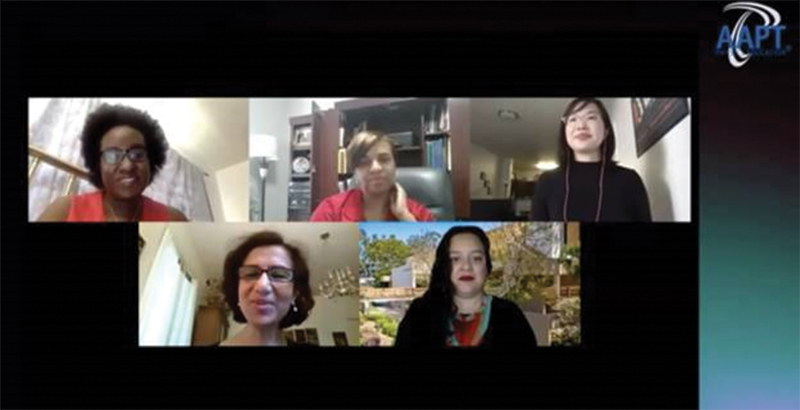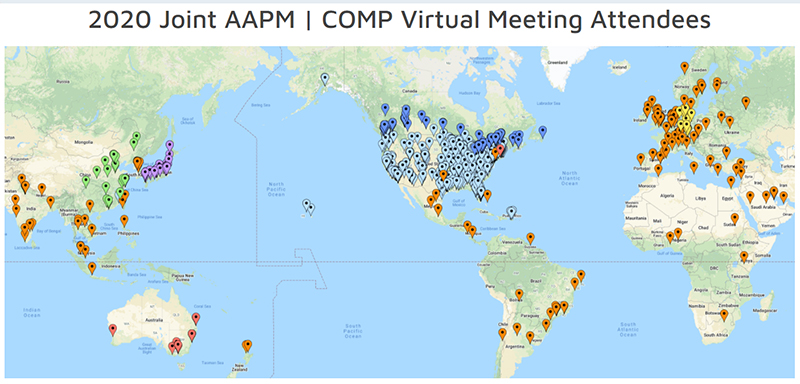Student Conferences – Sigma Pi Sigma Supports the Next Generation of Scientific Leaders through Crucial Grants and Awards
Spring
2021
Student Conferences – Sigma Pi Sigma Supports the Next Generation of Scientific Leaders through Crucial Grants and Awards
Brad R. Conrad, Director of the Society of Physics Students and Sigma Pi Sigma
 While travel remains something most students aren’t able to do much of this academic year, student presentations (whether virtual or in person) remain one of the most important professional development activities in which they can participate. Engaging in regional and national conferences provides students with a wealth of skills and experiences that will serve them throughout their careers. While presenting at conferences can be a challenging experience for many students, the professional connections they make there and the act of connecting to lifelong professional societies and their members can help students find career pathways, paid positions, and future collaborators. By sharing their physics and astronomy research and outreach, students not only participate in the scientific process but also hone their communication skills as they learn to share findings and interests with a wide audience. Such experiences allow them to practice their elevator speeches and develop an awareness of what it means to become part of the scientific community beyond their immediate research groups and academic departments. Often, students gain insights into how their research connects to other research groups or entire fields of study of which they were not aware. Science that occurs in a vacuum runs the risk of not helping to advance the field and our shared understanding of the universe.
While travel remains something most students aren’t able to do much of this academic year, student presentations (whether virtual or in person) remain one of the most important professional development activities in which they can participate. Engaging in regional and national conferences provides students with a wealth of skills and experiences that will serve them throughout their careers. While presenting at conferences can be a challenging experience for many students, the professional connections they make there and the act of connecting to lifelong professional societies and their members can help students find career pathways, paid positions, and future collaborators. By sharing their physics and astronomy research and outreach, students not only participate in the scientific process but also hone their communication skills as they learn to share findings and interests with a wide audience. Such experiences allow them to practice their elevator speeches and develop an awareness of what it means to become part of the scientific community beyond their immediate research groups and academic departments. Often, students gain insights into how their research connects to other research groups or entire fields of study of which they were not aware. Science that occurs in a vacuum runs the risk of not helping to advance the field and our shared understanding of the universe.
One of the primary goals of the Society of Physics Students is to be among the first membership societies that students experience to help prepare them to enter the professional community. Within its mission statement is a commitment to help students develop into contributing members of the professional community. While traditional coursework develops an extremely important set of skills, other skills are needed for students to flourish professionally, and student travel provides a vital key to unlocking those skills for many students.
As Sigma Pi Sigma members, we can help students acquire these skills by supporting undergraduates in overcoming the many financial burdens associated with participating in professional conferences and meetings. Each year the Society of Physics Students offers Student Travel and Student Reporter Awards for those who wish to attend, either to present their research or to report on a national or regional conference. While amounts are limited to $300 for an in-person event (or $75 to cover a virtual registration fee), these funds are a tremendous help for students as they piece together the support needed to participate in such meetings. Often, students will carpool, bring their own food, or share rooms to be able to afford to present work that represents the result of months or years of intensive focus and research. Having judged many undergraduate poster and oral presentations, I can personally attest that many people remember their first presentation with a mix of excitement and anxiety. It is because of the support of Sigma Pi Sigma members and the American Institute of Physics that SPS is able to offer these student awards each year.
If you would like to help support student presentations at regional and national meetings, please contribute to the Sigma Pi Sigma Endowment, which supports student travel grants and community events, or to the Congress Centennial Endowment, which supports student travel to the Sigma Pi Sigma Physics Congress, in perpetuity. Details can be found at the AIP Foundation’s Student Programs page: aip.org/helpstudents.

“Topics ranged from hard skills such as those used in diagnostic, imaging, and therapy physics, to softer skills like residency mentor–mentee relationships, social media, and alternative educational tracks. … All and all, I had a fantastic first AAPM|COMP experience that encouraged a greater understanding of what it means to be a medical physicist, specifically in response to growing need.”
– Michelle de Oliveira, on attending an American Association of Physicists in Medicine (AAPM) and the Canadian Organization of Medical Physicists (COMP) Conference with the support of an SPS Reporter Award.“After learning remotely for half a semester and moving online for my summer internship, I realized that the world was transitioning to remote practices for the next year and potentially longer. I wanted to understand the implication of this transition on national physics departments and to better understand the reasoning behind new learning practices implemented by teachers. Furthermore, being one of few female physics majors at Wake Forest University, I had a particular interest in the equity and inclusion aspects of the conference. … I believe that a teacher can completely change a student’s perspective on a subject and can play a significant role in his/her chosen academic path. Overall, I found the conference to be very insightful, and I am very grateful for the experience!”
- Sarah Anderson, on attending the American Association of Physics Teachers Summer 2020 Meeting with the support of an SPS Reporter Award.
